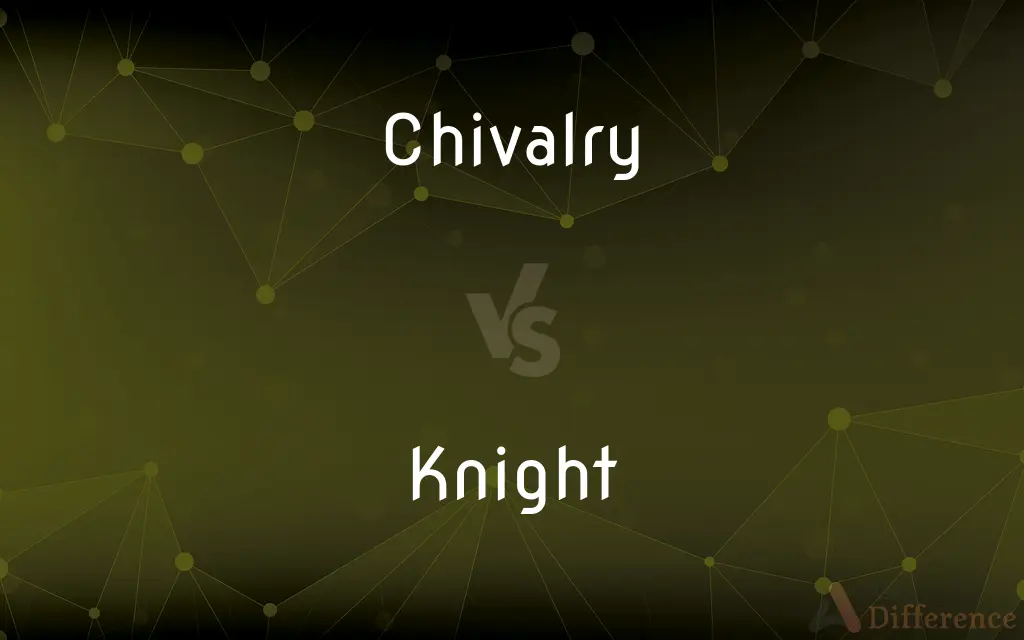Chivalry vs. Knight — What's the Difference?

Difference Between Chivalry and Knight
ADVERTISEMENT
Compare with Definitions
Chivalry
A manifestation of any of these qualities.
Knight
A knight is a person granted an honorary title of knighthood by a head of state (including the pope) or representative for service to the monarch, the church or the country, especially in a military capacity.Knighthood finds origins in the Greek hippeis and hoplite (ἱππεῖς) and Roman eques and centurion of classical antiquity.In the Early Middle Ages in Europe, knighthood was conferred upon mounted warriors. During the High Middle Ages, knighthood was considered a class of lower nobility.
Chivalry
Chivalry, or the chivalric code, is an informal and varying code of conduct developed between 1170 and 1220. It was associated with the medieval Christian institution of knighthood; knights' and gentlemen's behaviours were governed by chivalrous social codes.
Knight
A medieval tenant giving military service as a mounted man-at-arms to a feudal landholder.
Chivalry
The medieval system, principles, and customs of knighthood.
ADVERTISEMENT
Knight
A medieval gentleman-soldier, usually high-born, raised by a sovereign to privileged military status after training as a page and squire.
Chivalry
The qualities idealized by knighthood, such as bravery, courtesy, honor, and gallantry toward women.
Knight
A man holding a nonhereditary title conferred by a sovereign in recognition of personal merit or service to the country.
Chivalry
(Archaic) A group of knights or gallant gentlemen.
Knight
A man belonging to an order or brotherhood.
Chivalry
Cavalry; horsemen armed for battle.
Knight
A defender, champion, or zealous upholder of a cause or principle.
Chivalry
(obsolete) The fact or condition of being a knight; knightly skill, prowess.
Knight
The devoted champion of a lady.
Chivalry
The ethical code of the knight prevalent in Medieval Europe, having such primary virtues as mercy towards the poor and oppressed, humility, honour, sacrifice, fear of God, faithfulness, courage and utmost graciousness and courtesy to ladies.
Knight
Abbr. Kt or N(Games) A chess piece, usually in the shape of a horse's head, that can be moved two squares along a rank and one along a file or two squares along a file and one along a rank. The knight is the only piece that can jump other pieces to land on an open square.
Chivalry
Courtesy, respect and honourable conduct between opponents in wartime.
Knight
To raise (a person) to knighthood.
Chivalry
Courteous behaviour, especially that of men towards women.
Knight
(historical) A young servant or follower; a trained military attendant in service of a lord.
Chivalry
A tenure of lands by knightly service.
Knight
(historical) A minor nobleman with an honourable military rank who had served as a page and squire.
Chivalry
A body or order of cavaliers or knights serving on horseback; illustrious warriors, collectively; cavalry.
By his lightDid all the chivalry of England move,To do brave acts.
Knight
(by extension) An armored and mounted warrior of the Middle Ages.
King Arthur and the Knights of the Round Table
Chivalry
The dignity or system of knighthood; the spirit, usages, or manners of knighthood; the practice of knight-errantry.
Knight
A person obliged to provide knight service in exchange for maintenance of an estate held in knight's fee.
Chivalry
The qualifications or character of knights, as valor, dexterity in arms, courtesy, etc.
The glory of our Troy this day doth lieOn his fair worth and single chivalry.
Knight
(modern) A person on whom a knighthood has been conferred by a monarch.
Chivalry
A tenure of lands by knight's service; that is, by the condition of a knight's performing service on horseback, or of performing some noble or military service to his lord.
Knight
(literary) A brave, chivalrous and honorable man devoted to a noble cause or love interest.
Chivalry
Exploit.
Knight
(chess) A chess piece, often in the shape of a horse's head, that is moved two squares in one direction and one at right angles to that direction in a single move, leaping over any intervening pieces.
Chivalry
Courtesy towards women
Knight
A playing card bearing the figure of a knight; the knave or jack.
Chivalry
The medieval principles of knighthood
Knight
(entomology) Any of various nymphalid butterflies of the genus Ypthima.
Knight
(modern) Any mushroom belonging to genus Tricholoma.
Knight
(transitive) To confer knighthood upon.
The king knighted the young squire.
Knight
To promote (a pawn) to a knight.
Knight
A young servant or follower; a military attendant.
Knight
In feudal times, a man-at-arms serving on horseback and admitted to a certain military rank with special ceremonies, including an oath to protect the distressed, maintain the right, and live a stainless life.
Knights, by their oaths, should right poor ladies' harms.
Knight
A piece used in the game of chess, usually bearing a horse's head.
Knight
A playing card bearing the figure of a knight; the knave or jack.
Knight
To dub or create (one) a knight; - done in England by the sovereign only, who taps the kneeling candidate with a sword, saying: Rise, Sir --.
A soldier, by the honor-giving handOf CŒur-de-Lion knighted in the field.
Knight
Originally a person of noble birth trained to arms and chivalry; today in Great Britain a person honored by the sovereign for personal merit
Knight
A chessman in the shape of a horse's head; can move two squares horizontally and one vertically (or vice versa)
Knight
Raise (someone) to knighthood;
The Beatles were knighted
Share Your Discovery

Previous Comparison
Craps vs. Dice
Next Comparison
Slight vs. Light














































